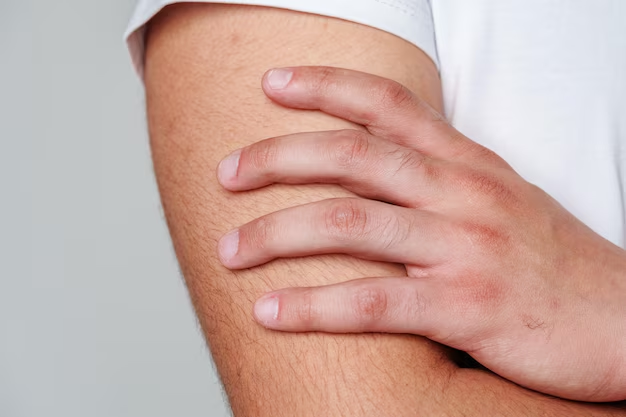Understanding Eczema: What Triggers This Common Skin Condition?
Imagine waking up to itchy, inflamed skin that demands your attention every minute of the day. For millions, this isn't just a nightmare; it's the reality of living with eczema. This chronic skin disorder, known for its red, itchy patches, can disrupt daily life, making understanding its triggers all the more crucial. So, what exactly sets off eczema, and how can you manage it?
What is Eczema?
Eczema, or atopic dermatitis, is more than just dry skin. It's an ongoing condition that can flare up unexpectedly, causing red, inflamed, and itchy skin. While it commonly appears in children, eczema can also persist into adulthood. Understanding the triggers is a vital step in managing and minimizing these flare-ups.
The Biology of Eczema
Immune System Dysfunction
At the heart of eczema lies an overactive immune response. The body mistakenly attacks its skin cells, leading to inflammation. This reaction is often heightened by exposure to triggers such as allergens and irritants, resulting in that familiar itchy rash.
Genetic Factors
Just like the color of your eyes or hair, eczema can be passed down through generations. If your family has a history of eczema, asthma, or hay fever, your chances of developing the condition increase. Genetic predisposition isn’t something you can change, but being aware of it can help you manage symptoms more effectively.
Common Triggers of Eczema
While the root cause of eczema is complex, several common triggers can provoke a flare-up:
Environmental Allergens
These are substances in your environment that might not bother most people but can trigger eczema in sensitive individuals:
- Dust mites: These tiny creatures thrive in bedding and upholstery, making them difficult to avoid entirely.
- Pollen: Particularly prevalent during the spring and summer months, pollen from trees, grasses, and flowers can provoke symptoms.
- Pet dander: Cats, dogs, and other furry pets shed skin flakes, which can cause irritation.
Irritants
Everyday products can irritate the skin of someone with eczema:
- Soaps and detergents: Harsh chemicals can strip the skin of its natural oils, leading to dryness and irritation.
- Fragrances: Perfumes and scented products can also act as irritants.
- Fabrics: Rough materials like wool or synthetic fabrics can rub against the skin and trigger a reaction.
Climate and Temperature
Both hot and cold weather can affect eczema:
- Heat: Sweat can exacerbate itchy skin, leading to more frequent scratching.
- Cold: Dry air can dehydrate the skin, causing it to crack and itch.
Stress
Although not a direct cause, stress can aggravate eczema. The body’s response to stress often includes a release of inflammatory chemicals, which can worsen symptoms. Finding effective stress management techniques can be crucial for those dealing with eczema.
Nutritional Influences
Diet
While food doesn't cause eczema, certain foods can trigger or worsen symptoms:
- Dairy, nuts, and wheat: Some individuals find that these foods aggravate their skin.
- Processed foods: Rich in additives and preservatives, these can sometimes act as triggers.
The Role of Hydration
Skin health is closely linked to hydration. Dehydration can make the skin dry and prone to eczema flare-ups. Ensuring you consume enough water daily helps maintain skin elasticity and moisture levels.
Practical Tips for Managing Triggers
Knowing your triggers is just the start; managing them is where real progress is made.
Create an Allergy-Free Home Environment
- Use hypoallergenic bedding to minimize exposure to dust mites.
- Install air purifiers to reduce pollen and dander indoors.
- Regularly clean and vacuum your living spaces to keep allergens at bay.
Skincare Routine Adjustments
- Opt for mild, fragrance-free soaps and lotions.
- Moisturize after bathing to lock in moisture.
- Avoid hot showers, which can strip the skin of its natural oils.
Clothing Choices Matter
- Select soft, natural fabrics like cotton.
- Wash new clothes before wearing to remove irritants.
- Opt for loose-fitting clothing to reduce friction and irritation.
Managing Stress Effectively
- Consider mindfulness techniques, such as meditation or yoga, to reduce stress.
- Regular exercise not only helps with stress but boosts overall health.
- Prioritize sleep, as rest is essential for both mental health and skin recovery.
Understanding and Preventing Flare-Ups
Being proactive about prevention is key to reducing the frequency and severity of eczema flare-ups. Here are some additional strategies:
Weather Preparedness
- Use a humidifier in colder months to add moisture to the air.
- Stay cool in summer by wearing lightweight clothing and using fans or air conditioning.
Diet and Nutrition
- Keep a food diary to track possible dietary triggers.
- Consult with a healthcare provider to explore potential food sensitivities.
Limiting Exposure to Known Triggers
- Identify personal irritants and allergens.
- Regularly review household and skincare product ingredients for potential irritants.
Closing Insight
In understanding and managing eczema triggers, the goal is not just to live with the condition but to thrive alongside it. By recognizing and adapting to your unique set of triggers, you empower yourself to reduce flare-ups and improve your quality of life. Small, mindful adjustments in daily habits can lead to significant improvements in skin health and overall well-being.
Practical Eczema Management Tips
- 🏡 Home Environment: Use hypoallergenic bedding and air purifiers.
- 🧴 Skincare Routine: Choose fragrance-free products and moisturize frequently.
- 🧘 Stress Management: Practice mindfulness and prioritize sleep.
- 🥤 Hydration is Key: Drink plenty of water to keep skin hydrated.
- 👗 Clothing Choices: Wear soft, natural fabrics and avoid tight-fitting clothes.
- 🌦️ Adapt to Weather: Utilize humidifiers in winter and stay cool in summer.
- 🍽️ Diet Diary: Track foods to identify and avoid dietary triggers.

